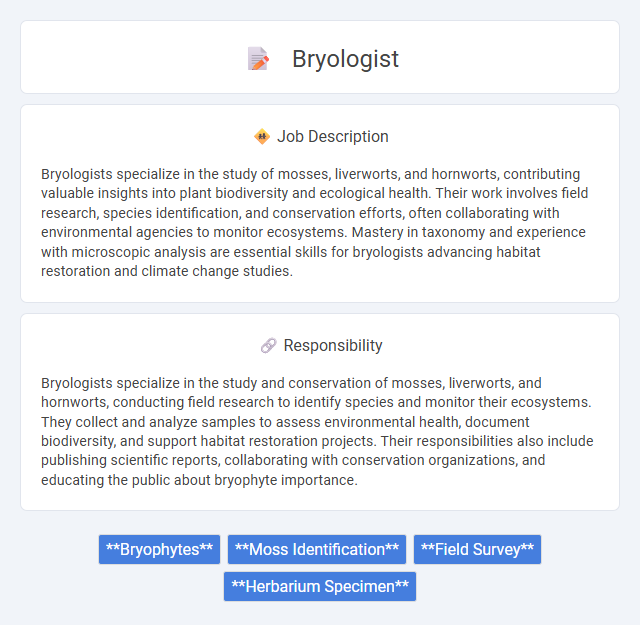
Bryologists specialize in the study of mosses, liverworts, and hornworts, contributing valuable insights into plant biodiversity and ecological health. Their work involves field research, species identification, and conservation efforts, often collaborating with environmental agencies to monitor ecosystems. Mastery in taxonomy and experience with microscopic analysis are essential skills for bryologists advancing habitat restoration and climate change studies.
People with strong attention to detail and a passion for nature are likely suitable for a bryologist career, as it involves studying mosses, liverworts, and hornworts extensively. Those who thrive in outdoor environments and possess patience for meticulous research may find this job fulfilling. Individuals who prefer dynamic social interactions might be less compatible, given the solitary and focused nature of the work.
Qualification
Bryologists require specialized education in botany or plant sciences, typically holding a bachelor's degree, with many positions demanding a master's or doctoral degree focusing on bryophytes. Proficiency in fieldwork techniques, microscopic analysis, and taxonomy of mosses, liverworts, and hornworts is essential for accurate species identification and ecological research. Experience with GIS technology and environmental data analysis enhances job performance within conservation projects and academic research settings.
Responsibility
Bryologists specialize in the study and conservation of mosses, liverworts, and hornworts, conducting field research to identify species and monitor their ecosystems. They collect and analyze samples to assess environmental health, document biodiversity, and support habitat restoration projects. Their responsibilities also include publishing scientific reports, collaborating with conservation organizations, and educating the public about bryophyte importance.
Benefit
The job of a bryologist likely offers significant benefits including opportunities for contributing to ecological research, biodiversity conservation, and environmental management. Bryologists may experience professional growth through fieldwork and collaboration with academic or conservation institutions. The role could also provide a meaningful connection to nature and potential involvement in groundbreaking discoveries related to mosses, liverworts, and hornworts.
Challenge
A bryologist likely encounters the challenge of accurately identifying and classifying diverse moss, liverwort, and hornwort species, which often require meticulous microscopic examination and fieldwork in remote or harsh environments. The difficulty may increase due to the subtle morphological differences among species and the need for in-depth ecological knowledge. Overcoming these challenges is crucial for advancing understanding of bryophyte biodiversity and their role in ecosystems.
Career Advancement
Bryologists specializing in mosses, liverworts, and hornworts advance their careers by engaging in botanical research, environmental consulting, and academic roles. Gaining expertise in field identification, ecological assessment, and conservation strategies enhances opportunities for leadership positions in scientific organizations and environmental agencies. Publishing research and contributing to biodiversity projects also solidify their reputation, leading to higher-level roles and specialized consultancy work.
Key Terms
Bryophytes
Bryologists specialize in the study of bryophytes, a group of non-vascular plants including mosses, liverworts, and hornworts, which play critical roles in ecosystems as bioindicators and in soil formation. Expertise in bryophyte taxonomy, ecology, and physiology supports conservation efforts and advances scientific understanding of their unique life cycles and environmental responses. Field research, laboratory analysis, and herbarium curation are key components of a bryologist's work, contributing to biodiversity assessments and climate change studies.
Moss Identification
Bryologists specializing in moss identification meticulously examine morphological traits and reproductive structures to accurately classify species within the Bryophyta division. Advanced microscopic analysis and field surveys facilitate the differentiation of closely related moss taxa, contributing to ecological assessments and biodiversity conservation. Expertise in moss identification supports habitat restoration projects and advances scientific understanding of environmental indicators.
Field Survey
Bryologists specializing in field survey conduct systematic identification and documentation of moss, liverwort, and hornwort species in natural habitats. Their work involves collecting specimens, recording environmental conditions, and mapping distribution patterns to assess ecosystem health and biodiversity. Advanced skills in taxonomy, GPS technology, and data analysis are essential for accurate field survey results and conservation planning.
Herbarium Specimen
Bryologists specialize in the study and preservation of mosses, liverworts, and hornworts, frequently working with herbarium specimens to catalog and analyze these plants. Herbarium specimens serve as vital references for bryologists, providing preserved samples that support taxonomic research, biodiversity assessments, and ecological studies. Their expertise ensures accurate identification and documentation, which ultimately aids in conservation efforts and enhances scientific understanding of bryophyte diversity.
 kuljobs.com
kuljobs.com